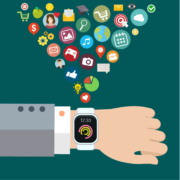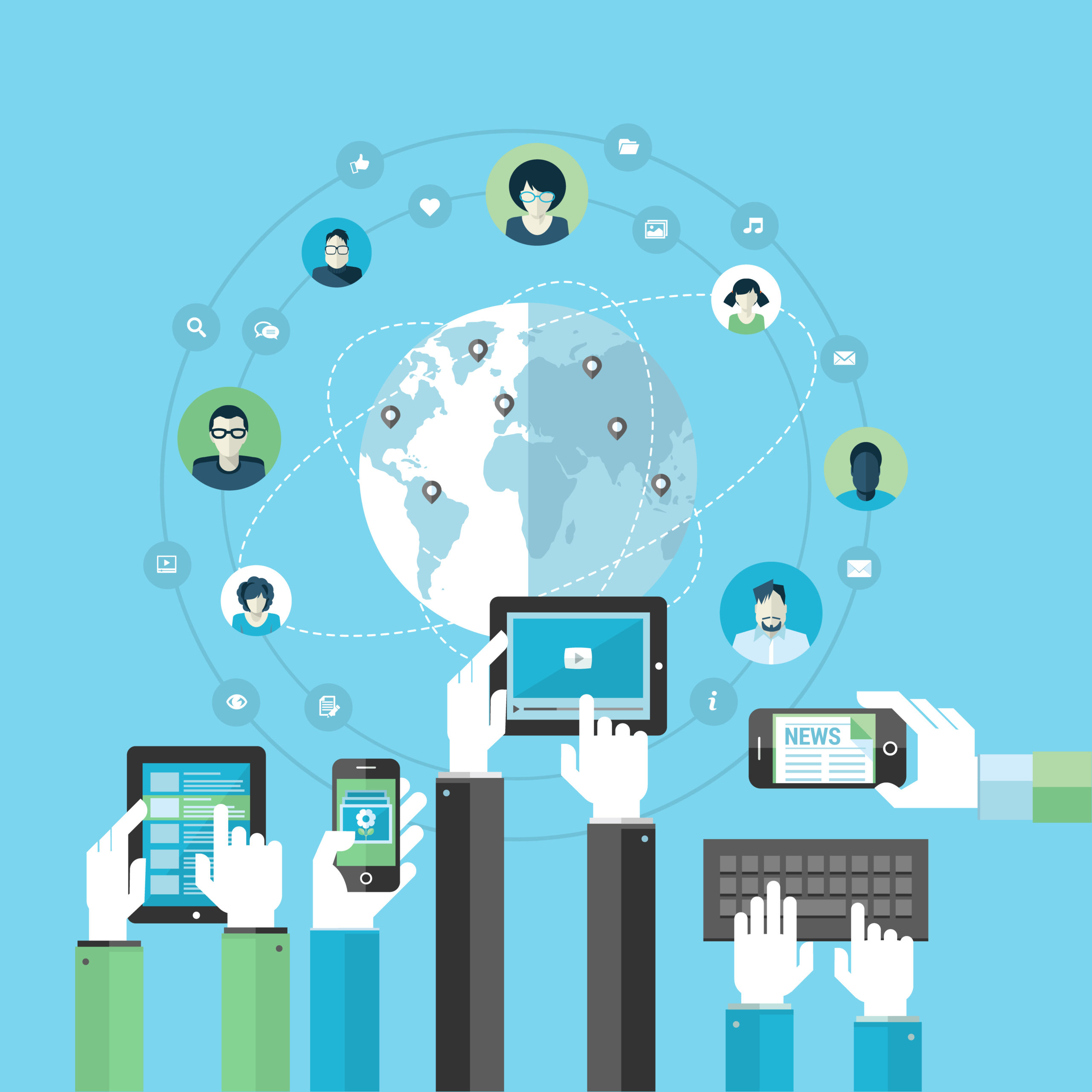This article is not about fancy numbers to show changing trends in the world, but a simple take on what is happening all around.
I got my first home desktop when I was in college. Although I studied Engineering, I was never a tech geek. My interest was always people, and while I hoped to get into HR, I landed in the world of PR, which took me to social media, and finally to making me a digital marketing trainer. I like to be chilled out and not change too frequently. I resisted buying my first BlackBerry, immensely resisted moving to a ‘Touchscreen’ and am still to make the transition to the Apple family. The world may move fast, but some of us are more in love with the past.
The present day problem or let’s call it the revolution is extraordinary. A host of technological advancements is coming together to change the face of the planet. While there are developments in almost every field, digitally we are surging ahead at top speed. Now I like presenting thoughts in a point wise manner and will try to do the same right now.
1. SMS is Dead, WhatsApp killed it
Yes, we still get promotional SMSes and some others too, but just look at how swiftly and conveniently, a small startup with less than 50 engineers, took over the world with its chat application and practically killed the short messaging service industry. They didn’t have to build the infrastructure, Tim Berners-Lee built it. They didn’t have to build the platform, the people at Google and Apple built it. They didn’t have to worry about making money, Facebook bought their app. Airtel, Vodafone, Idea combined lost to a 50 member team?
2. The local transport industry is rattled, a Taxi App shook them up
Uber. Why didn’t anybody think of this earlier? A simple app to solve your travelling woes. Go to any major city in the world; no haggling, no worrying, just call an Uber. A company, which has had its fair share of controversies, is globally today, one of the most valued companies in the world. A simple solution that connects taxi drivers with commuters, thus eliminating all the red tape that was involved in allowing somebody to drive a cab, eliminating all the hassles of delayed payments for the drivers, and eliminating the trouble of finding public transport at odd hours, all through a simple mobile app.
3. Turning watches into accessories

On one hand, watches are getting fancier and more expensive by the day; on the other, the industry is bleeding because nobody wants a watch anymore! Not as a necessity that is. The Titans of the world (pun intended) are facing the wrath of the smart phones and even smarter watches. I don’t need to look at my wrist to know the time, my mobile takes care of that. Are mobile phones disrupting the watch industry of the world? Thought nobody, ever.
4. The Idiot Box. A title that finally makes sense.
Video killed the Radio star. And now YouTube killed the TV star. The numbers be damned, just look around and see how many people actively watch TV, and you would hopefully be surprised. Blame it on The Pirate Bay, YouTube, Netflix or whatever else; when the quality of what I get elsewhere is much better than what I see on TV, then why should I keep watching TV? No wonder then, Netflix is already a rage in parts of the world, Star network launched Hotstar and you would have seen your first Chromecast at somebody’s home already. Cable TV is old news, on-demand entertainment is the need of the hour. It’s an entertainment democracy, and people will watch, what they want to watch when they want to watch. The television will eventually be reduced to a screen that will be used to stream. 10 years tops.
5. Newspapers. The beginning of the end of an era.
 I love my daily supply of newspaper. There are many others who do. But that can’t allow you to deny the obvious. Online media consumption is taking over. People don’t have time. People are lazy. People don’t like reading too much. People read what others are reading. People suffer from FOMO (Fear of Missing Out). People need their news. But people need it right now. Facebook, Twitter, inShorts, news apps, news sites and multiple other online multimedia outlets are helping people get what they need, fulfill what they crave, replace what they used to read. The rise of online portals like BuzzFeed, HuffingtonPost, of Exchange4media taking over the Business World magazine, of The Quint and the YourStory becoming primary sources and authority of their domains, are just some of the many factors that tell you that this is the beginning of the end of an era. When you want to see what the future holds in store, simply look at what the youngsters are up to. If the average 20-year-old doesn’t read it, you can be rest assured that the next lot of youngsters wouldn’t either.
I love my daily supply of newspaper. There are many others who do. But that can’t allow you to deny the obvious. Online media consumption is taking over. People don’t have time. People are lazy. People don’t like reading too much. People read what others are reading. People suffer from FOMO (Fear of Missing Out). People need their news. But people need it right now. Facebook, Twitter, inShorts, news apps, news sites and multiple other online multimedia outlets are helping people get what they need, fulfill what they crave, replace what they used to read. The rise of online portals like BuzzFeed, HuffingtonPost, of Exchange4media taking over the Business World magazine, of The Quint and the YourStory becoming primary sources and authority of their domains, are just some of the many factors that tell you that this is the beginning of the end of an era. When you want to see what the future holds in store, simply look at what the youngsters are up to. If the average 20-year-old doesn’t read it, you can be rest assured that the next lot of youngsters wouldn’t either.
6. Rate of loss of Jobs will far exceed the rate of creation
This one hurts, it truly does. And most would like to turn a blind eye to this reality. But while it hurts, here’s the truth. Technology is responsible for creating a lot of new jobs, and the same technology is going to eat them too. The average American does not feel too happy about their job having been outsourced to India. Yes, cheaper workforce did it, but technology enabled it. Skype and GoToMeetings and a thousand other products make the world feel like a small village. India scored because companies could scale up easily here, and we spoke English. The next phase now begins.
Many companies have reported that they will invest in automating their processes, thus cutting down on their workforce, while many multinationals have already started shifting their base to other Asian countries. While this may not affect a large population all at once, but even a tiny difference or shift will create a huge dent. This holds true for not just the IT industry, but many other industries too. Functions like sales, marketing, and recruitment are all becoming more automated, and more focused online. What took 10 people to complete a job before can now be completed by 2. Companies are happier to pay fewer people better salaries than keeping all 10 on the rolls. Only way out? Skill Up.
(Editor’s plug – you might want to check out LeadSquared if you are also thinking about automating your sales and marketing process)

7. Banks are worried by what was once a Phone Recharging App
How in this world can a phone app, meant to recharge mobile phones threaten the biggest banks in the country? Only Paytm would know. First came the banks, then the cheques, then came ATM, online banking followed and now mobile wallets are taking over. No, it is not a replacement for a bank, but it can well become the replacement for banking transactions. What you paid for through an ATM Card, controlled by a bank so far could be (is being) done by wallets, what you paid for in cash can be paid for through the wallet, what you withdrew at the ATM may not be required, if and only if they scale up and encompass various sectors and industries. The banks are not worried that they will lose customers, but when a customer doesn’t transact or contact the bank that often, then it leads to loss of cross sell and up sell revenue, and more importantly slowly eliminates the card economy. Seems difficult to believe? You wouldn’t have ever believed that a plastic card and a website could replace bank queues and the use of cheques either, could you?

8. Digital made global giants fall to their knees
Kodak and Nokia are prime examples of the catastrophic collateral damage of the digital world. The digital camera made Kodak go bankrupt while the smarter Samsung and Apple made Nokia leave its pole position (yes, they are making a strong comeback, but what a fall that was). BlackBerry went from talk of the town to an outsider in no time, and Samsung itself fell behind the cheaper and costlier competitors after winning the war from Nokia. These are companies which are standing tall for multiple decades, but a decade is all it took for digital to defeat them.
The writing is on the wall and hope you are reading it as clearly. The world changes dynamically with dynamic changes in the web, in the world of digital. There is lesser permanence, lesser stability, and lesser scope for showing complacency. You may have been the best there ever was, but if you don’t change with the changing times, then you for sure will be left behind. There is no one answer to what will happen next, but you can only gear up for what lies ahead. There is nothing you are supposed to suddenly do, but a wake-up call to that mind of yours wouldn’t hurt too.








